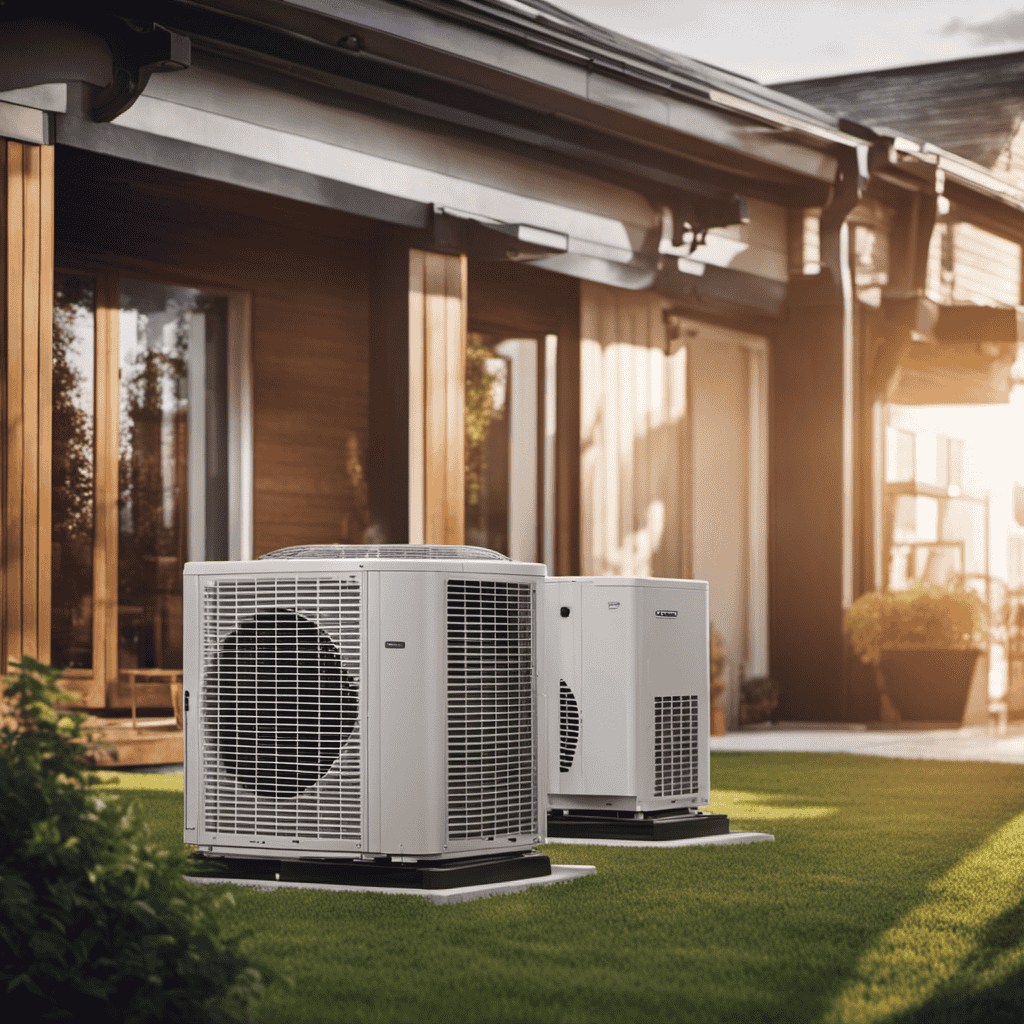Tired of struggling to maintain the perfect temperature in your home? Look no further! This article will guide you through the world of heat pumps, helping you master the art of controlling your home’s climate.
We’ll explain how heat pumps work, the advantages they offer, and how to choose the right size for your home. With our tips and tricks, you’ll be able to optimize your heat pump’s performance and maximize energy efficiency.
Let’s get started on creating the perfect climate for your home!
Key Takeaways
- Heat pumps transfer heat from one location to another, extracting heat from the outside air or ground to warm homes in colder months and expelling heat from indoor air to cool living spaces in hotter months.
- Regular maintenance is essential for optimal performance and efficiency of heat pumps, extending their lifespan and saving money in the long run.
- Heat pumps are energy-efficient, consuming less energy compared to traditional heating and cooling systems, resulting in significant energy savings and reduced utility bills.
- Proper heat pump sizing is crucial for efficient and effective residential climate control, and seeking the expertise of a qualified HVAC professional ensures the best results in terms of energy efficiency, comfort, and cost savings.
Understanding How Heat Pumps Work
We’ll explain how heat pumps work to efficiently control the temperature in our homes. Heat pump efficiency is a crucial factor to consider when it comes to residential climate control.
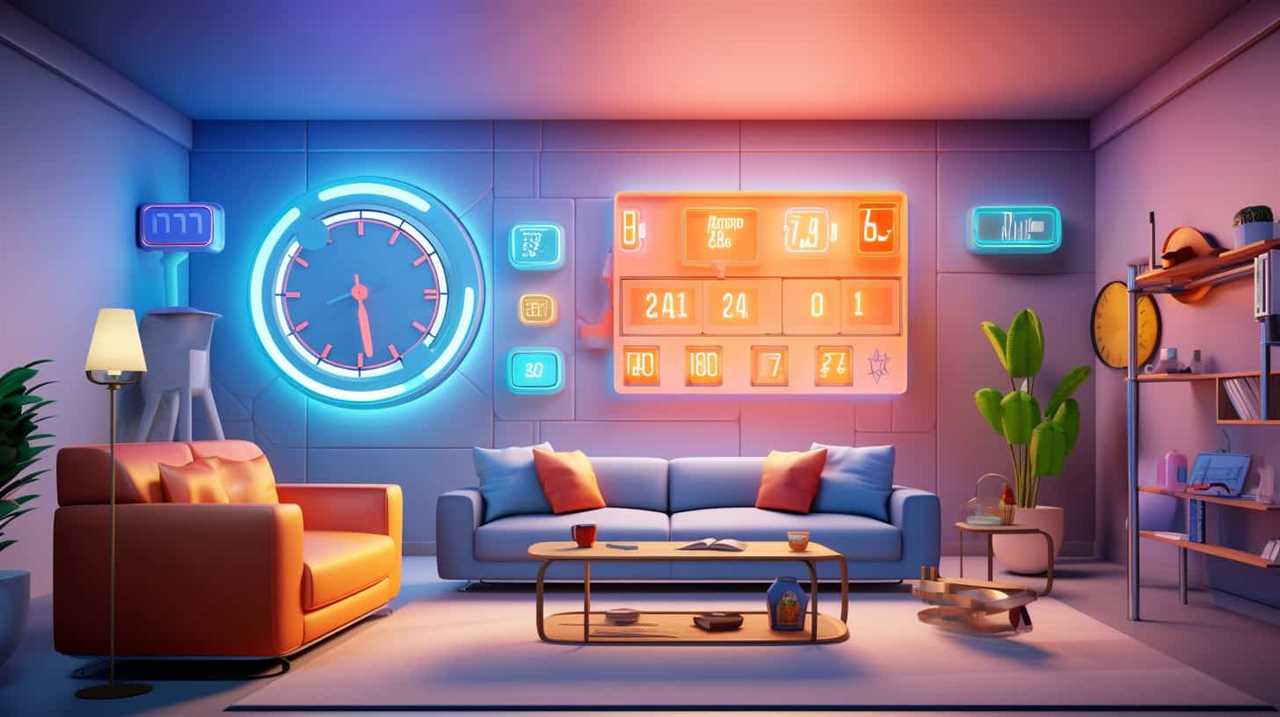
Heat pumps are designed to transfer heat from one location to another, utilizing a small amount of energy to achieve this process. By extracting heat from the outside air or ground, heat pumps can warm our homes during colder months.
Conversely, during hotter months, they can extract heat from indoor air and expel it outside, effectively cooling our living spaces.
Regular heat pump maintenance is essential to ensure optimal performance and efficiency. This includes cleaning or replacing filters, checking refrigerant levels, and inspecting the overall system for any potential issues.
Proper maintenance not only promotes energy efficiency but also extends the lifespan of the heat pump, saving homeowners money in the long run.

The Advantages of Heat Pumps for Residential Climate Control
Heat pumps offer numerous benefits for residential climate control, making them an ideal choice for homeowners. Here are three advantages of heat pumps that make them stand out:
Energy Efficiency: Heat pumps are highly efficient in providing both heating and cooling to your home. They work by transferring heat from the outside air to either warm or cool your living space. This process consumes less energy compared to traditional heating and cooling systems, resulting in significant energy savings and reduced utility bills.
Environmentally Friendly: Heat pumps are a greener alternative to fossil fuel-based heating systems. They don’t burn any fuel to generate heat, which means they produce fewer greenhouse gas emissions. By choosing a heat pump, you can contribute to reducing your carbon footprint and help protect the environment.
Year-Round Comfort: Heat pumps offer consistent and comfortable indoor temperatures throughout the year. They can efficiently heat your home in winter and cool it in summer, providing a comfortable living environment regardless of the season.
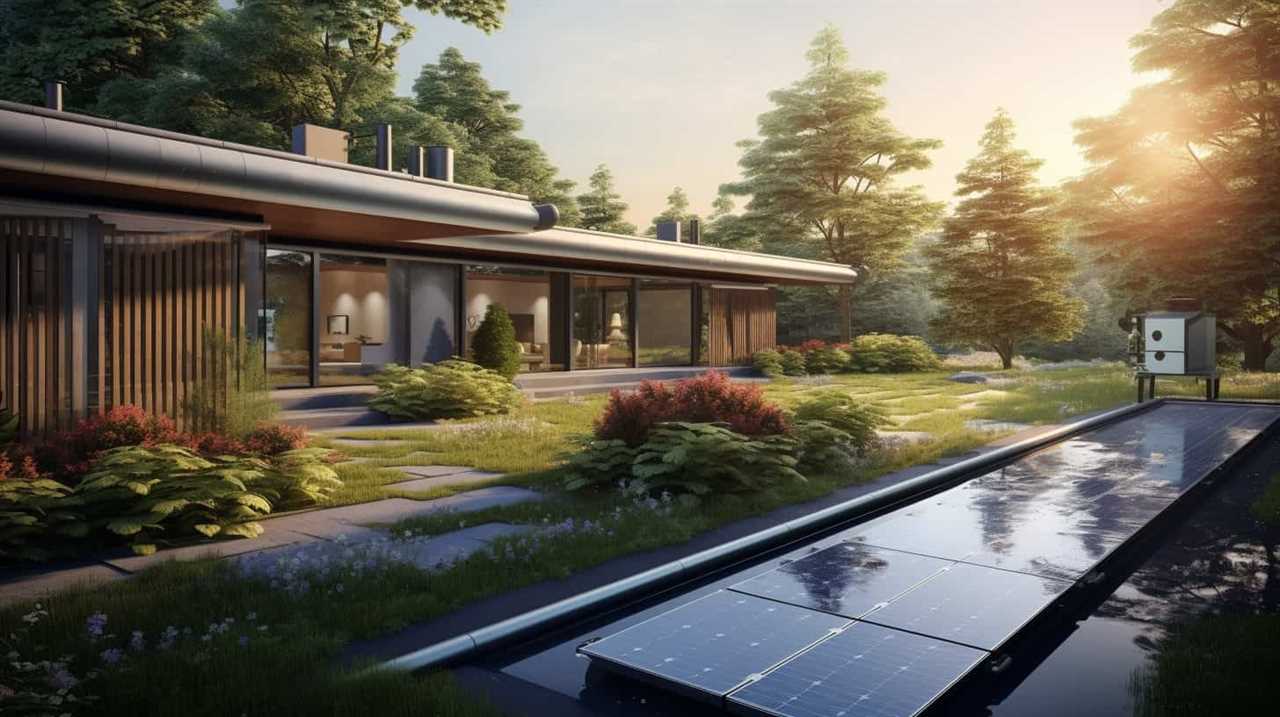
With these advantages in mind, let’s now explore how to choose the right size heat pump for your home.
Choosing the Right Size Heat Pump for Your Home
When choosing the right size heat pump for our home, there are several important points to consider.
Optimal heat pump size is crucial in order to effectively heat or cool our living space. We must also take into account the size of our home and its specific heating and cooling needs.
Additionally, we need to balance efficiency and cost to ensure we’re making the most economical choice.

Optimal Heat Pump Size
Our goal is to find the most suitable heat pump size for our home. Choosing the right size heat pump is crucial for efficient and effective residential climate control.
Here are three key considerations when determining the optimal heat pump size:
Heat pump capacity: It’s essential to assess the heating and cooling needs of your home accurately. Factors such as the size of the space, insulation, and climate conditions play a significant role in determining the required heat pump capacity.
Sizing considerations: Oversized or undersized heat pumps can lead to energy inefficiency, increased costs, and reduced comfort. Proper sizing involves evaluating factors like the home’s square footage, layout, window efficiency, and insulation levels to ensure the heat pump can adequately heat and cool the space.

Professional assessment: Seeking the expertise of a qualified HVAC professional is crucial for accurate heat pump sizing. They can perform load calculations and consider all relevant factors to determine the ideal heat pump size for your home, optimizing energy efficiency, comfort, and cost savings.
Finding the optimal heat pump size requires careful consideration of heat pump capacity and various sizing factors, and professional guidance ensures the best results for your home.
Home Size Considerations
Determining the appropriate size heat pump for our home depends on the size of our living space and other relevant factors. When considering the size of our home, it is important to take into account the layout and insulation requirements. A well-insulated home with an efficient layout will require a smaller heat pump compared to a larger, poorly insulated home. To help understand the relationship between home size and heat pump size, consider the following table:
| Home Size | Heat Pump Size |
|---|---|
| Small | 1.5 – 2 tons |
| Medium | 2 – 3 tons |
| Large | 3 – 5 tons |
Efficiency and Cost
Choosing the right size heat pump for our home requires considering both efficiency and cost. When it comes to efficiency, we want to maximize our energy savings while ensuring that the heat pump operates at its optimal capacity. Here are three key factors to keep in mind:

Proper sizing: It’s crucial to choose a heat pump that’s the right size for our home. An oversized heat pump will cycle on and off frequently, leading to poor efficiency and increased energy consumption. On the other hand, an undersized heat pump will struggle to meet our heating and cooling needs, resulting in reduced comfort and higher energy bills.
Energy efficiency rating: Look for heat pumps with high energy efficiency ratings, such as those certified by ENERGY STAR. These units are designed to provide cost-effective heating and cooling while minimizing energy usage.
Lifecycle cost: Consider the cost effectiveness of the heat pump over its entire lifespan, including installation, maintenance, and energy consumption. While a more efficient heat pump may have a higher upfront cost, it can lead to significant long-term savings through reduced energy bills.
Installing a Heat Pump: What to Consider
When installing a heat pump, we must take into account the specific requirements of our home and the available space for the unit. Proper installation is crucial for optimal performance and energy efficiency. To ensure a successful installation, it is important to follow a heat pump installation checklist and avoid common heat pump installation mistakes. Here is a table summarizing the key considerations during the installation process:

| Consideration | Description |
|---|---|
| Location | Choose an appropriate location for the heat pump unit that allows for efficient airflow and noise reduction. |
| Sizing | Determine the correct size of the heat pump based on the heating and cooling needs of your home. Oversized or undersized units can lead to inefficiencies. |
| Ductwork | Inspect and seal the ductwork to prevent air leaks and ensure proper airflow distribution. |
| Electrical Requirements | Ensure that the electrical system meets the power requirements of the heat pump and hire a qualified electrician if necessary. |
| Refrigerant Lines | Properly size and insulate the refrigerant lines to minimize energy loss and optimize system performance. |
Maximizing Energy Efficiency With Heat Pumps
How can we effectively maximize the energy efficiency of our heat pumps? Here are three key strategies to consider:
Regular maintenance: Schedule annual maintenance checks to ensure your heat pump is running at its optimal efficiency. This includes cleaning or replacing filters, inspecting ductwork, and lubricating moving parts. Regular maintenance not only improves air quality but also extends the lifespan of your heat pump.
Proper insulation: Insulate your home effectively to reduce heat loss and gain. Well-insulated walls, floors, and ceilings prevent energy wastage and help your heat pump operate more efficiently. Consider insulating windows and doors as well to further reduce energy consumption.
Smart thermostat: Install a programmable or smart thermostat to control and optimize your heat pump’s performance. Set temperature schedules based on your daily routines to avoid unnecessary heating or cooling. Some smart thermostats also provide energy usage reports, allowing you to track and adjust your energy consumption accordingly.

Tips for Optimizing Heat Pump Performance in Winter
To optimize heat pump performance in winter, we need to focus on two main factors: thermostat settings and weather-proofing.
By properly setting the thermostat, we can ensure that the heat pump operates at the most efficient temperature. This not only saves energy but also reduces costs. Adjusting the thermostat to a lower temperature when the house is empty or at night can significantly reduce energy consumption without sacrificing comfort. On the other hand, setting the thermostat too high can cause the heat pump to work harder than necessary, leading to increased energy usage and higher bills.
In addition to thermostat settings, weather-proofing measures are crucial for energy savings. Air leaks around windows, doors, and other openings can allow cold air to enter the house and warm air to escape, putting unnecessary strain on the heat pump. By sealing these leaks with weatherstripping or caulk, we can prevent heat loss and maintain a comfortable indoor temperature. Insulating windows and doors further helps to minimize heat transfer and improve the overall efficiency of the heat pump.
Thermostat Settings for Efficiency
We can maximize heat pump efficiency during winter by adjusting the thermostat. Proper thermostat programming is essential for energy saving strategies. Here are three tips to optimize heat pump performance and save on energy costs:

Set the temperature lower when you’re away: Lowering the thermostat by a few degrees when you aren’t at home can significantly reduce energy consumption.
Use programmable thermostats: Programmable thermostats allow you to set different temperature levels for different times of the day, ensuring that your heat pump operates efficiently and only when needed.
Take advantage of setback temperatures: Setback temperatures allow you to reduce the temperature during sleeping hours or when you’re away for an extended period. This can result in substantial energy savings without sacrificing comfort.
By implementing these thermostat settings, you can optimize your heat pump’s performance and reduce your energy consumption during the winter months.

Now, let’s move on to the next section about weather-proofing for additional energy savings.
Weather-Proofing for Energy Savings
Before we delve into weather-proofing tips for optimizing heat pump performance in winter, it’s important to understand the impact of weather conditions on energy efficiency. By implementing energy-saving techniques and insulation methods, homeowners can significantly reduce their energy consumption and save money on heating costs during the colder months.
One effective method of weather-proofing is to ensure proper insulation throughout the home. This includes insulating the attic, walls, and floors to prevent heat loss. Additionally, sealing any gaps or cracks around windows and doors can help minimize drafts and maintain a consistent indoor temperature.
Another crucial aspect is maintaining a well-insulated duct system. Leaky ducts can lead to a significant loss of heated air, reducing the overall efficiency of the heat pump. By properly insulating and sealing ducts, homeowners can ensure that heated air is delivered efficiently to each room.
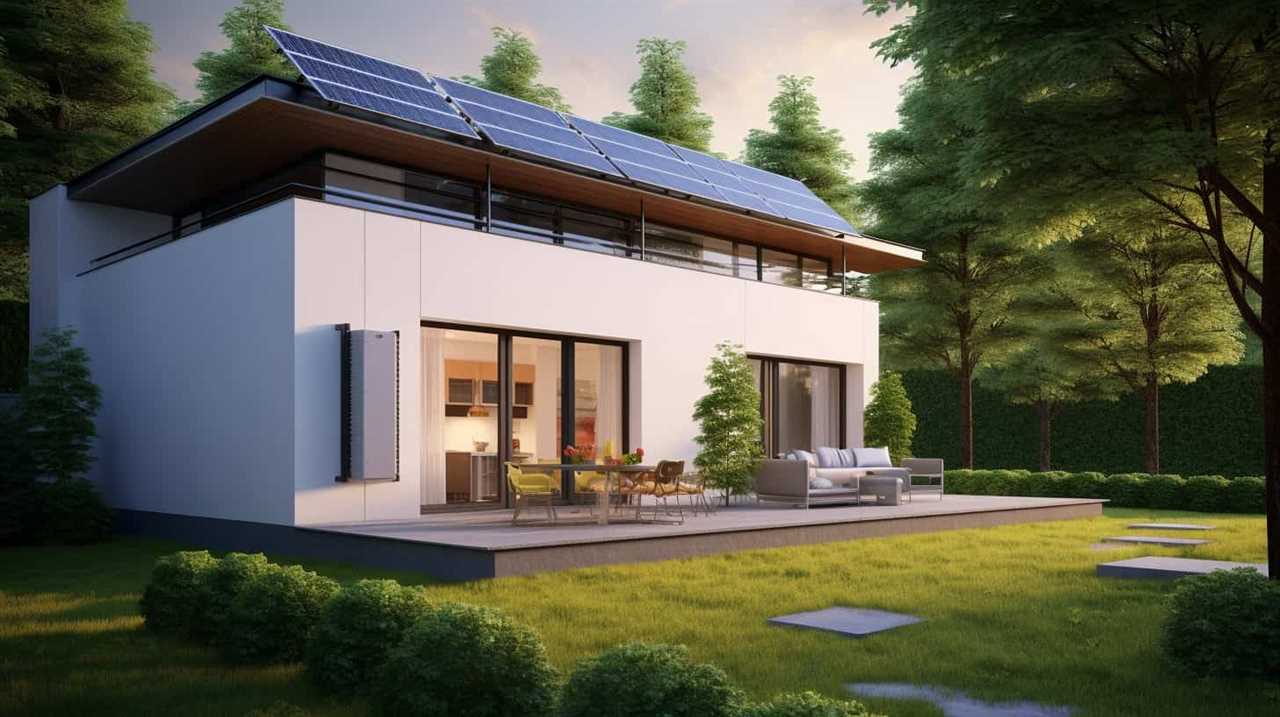
Tips for Optimizing Heat Pump Performance in Summer
Maximizing heat pump efficiency in summer requires proper maintenance and regular cleaning. To improve cooling efficiency and reduce energy consumption, consider the following tips:
Clean or replace air filters regularly: Clogged filters restrict airflow, making your heat pump work harder and consume more energy. Cleaning or replacing filters every 1-3 months can significantly improve cooling performance.
Keep the outdoor unit clear: Ensure that the outdoor unit is free from debris, leaves, and obstructions. This allows for proper airflow and prevents the heat pump from overheating.
Schedule regular professional maintenance: A qualified technician can inspect and tune up your heat pump, ensuring optimal performance and identifying any potential issues before they become major problems.
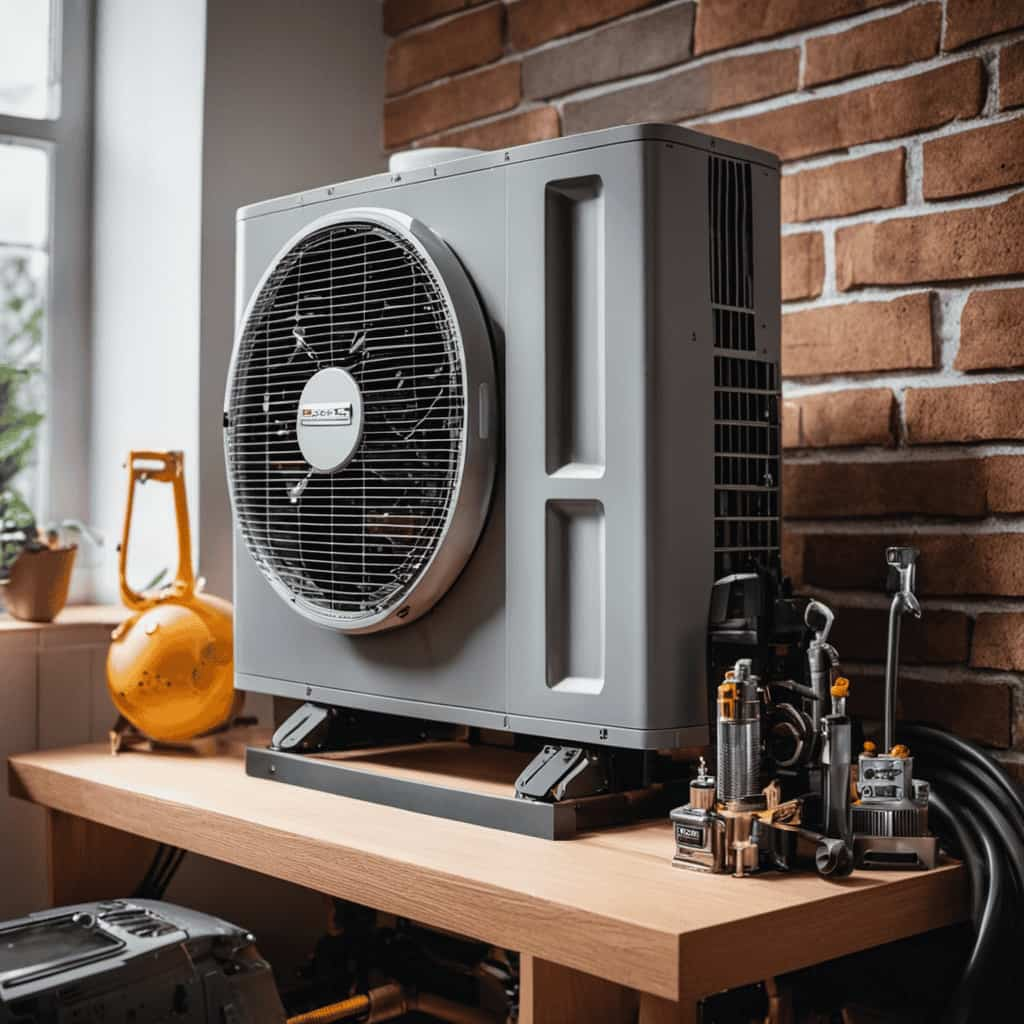
Maintaining and Troubleshooting Your Heat Pump System
To effectively maintain and troubleshoot your heat pump system, it is important to regularly clean and inspect the filters, coils, and outdoor unit, as well as monitor for any potential issues such as refrigerant leaks or unusual noises. By following proper maintenance best practices, you can ensure the optimal performance and longevity of your heat pump system.
One common issue that homeowners may encounter is a frozen evaporator coil. This can be caused by restricted airflow due to dirty filters or blocked vents. To troubleshoot this problem, check and clean the filters regularly, and ensure that the vents are clear of any obstructions.
Another common issue is inadequate heating or cooling. This could be due to a refrigerant leak or a malfunctioning compressor. If you notice a decrease in performance, it is best to contact a professional technician to diagnose and repair the issue.
Below is a table that outlines some common troubleshooting issues and maintenance best practices for your heat pump system:
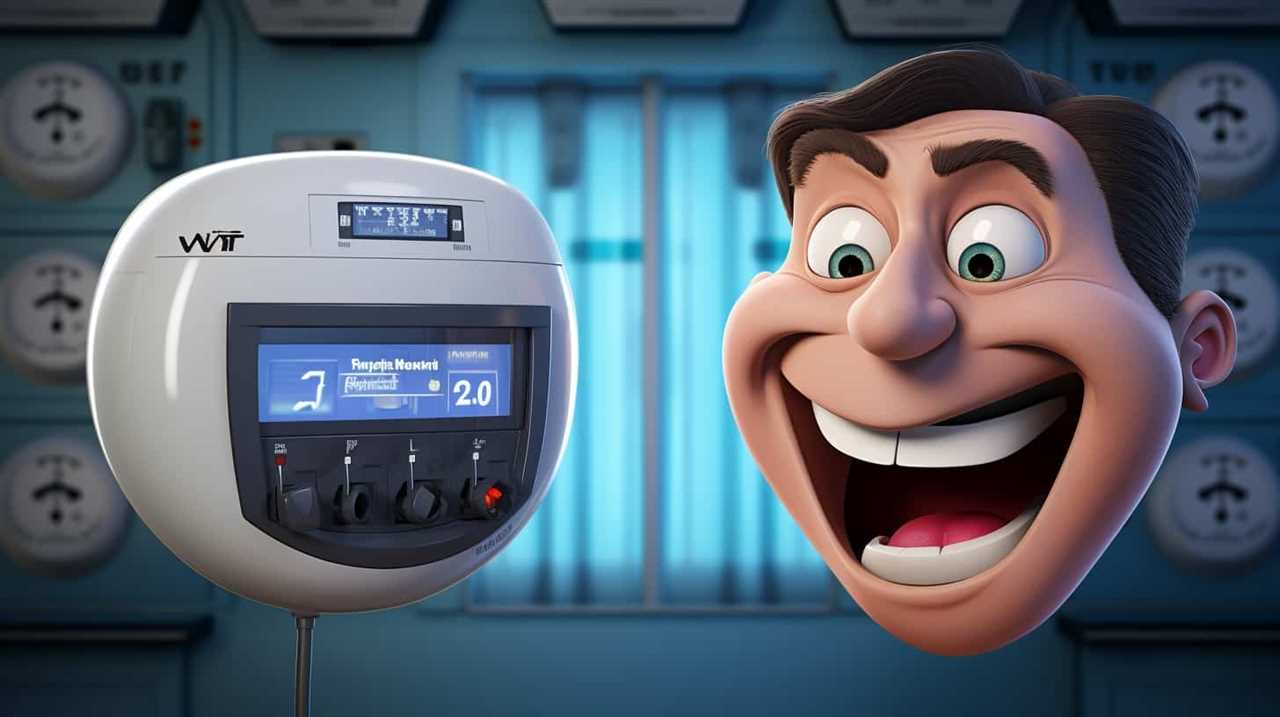
| Common Issues | Maintenance Best Practices |
|---|---|
| Frozen evaporator | Regularly clean filters |
| coil | and inspect coils |
| Inadequate heating | Monitor for refrigerant |
| or cooling | leaks |
| Unusual noises | Schedule professional |
| maintenance check |
Remember to always consult the manufacturer’s manual for specific maintenance instructions and guidelines. Regular maintenance and prompt troubleshooting can help ensure that your heat pump system operates efficiently and keeps your home comfortable.
Exploring Advanced Features and Technology in Heat Pumps
Our heat pumps offer a variety of advanced features and technology, allowing us to maximize climate control in our homes. With the latest advancements in heat pump technology, we can now enjoy a more efficient and comfortable living environment.
Here are three innovative heat pump features that are revolutionizing the way we control our indoor climate:
Smart Thermostat Integration: Our heat pumps are equipped with smart thermostat compatibility, allowing you to control your system remotely through your smartphone or voice commands. This feature ensures that your home is always at the perfect temperature, even when you’re away.
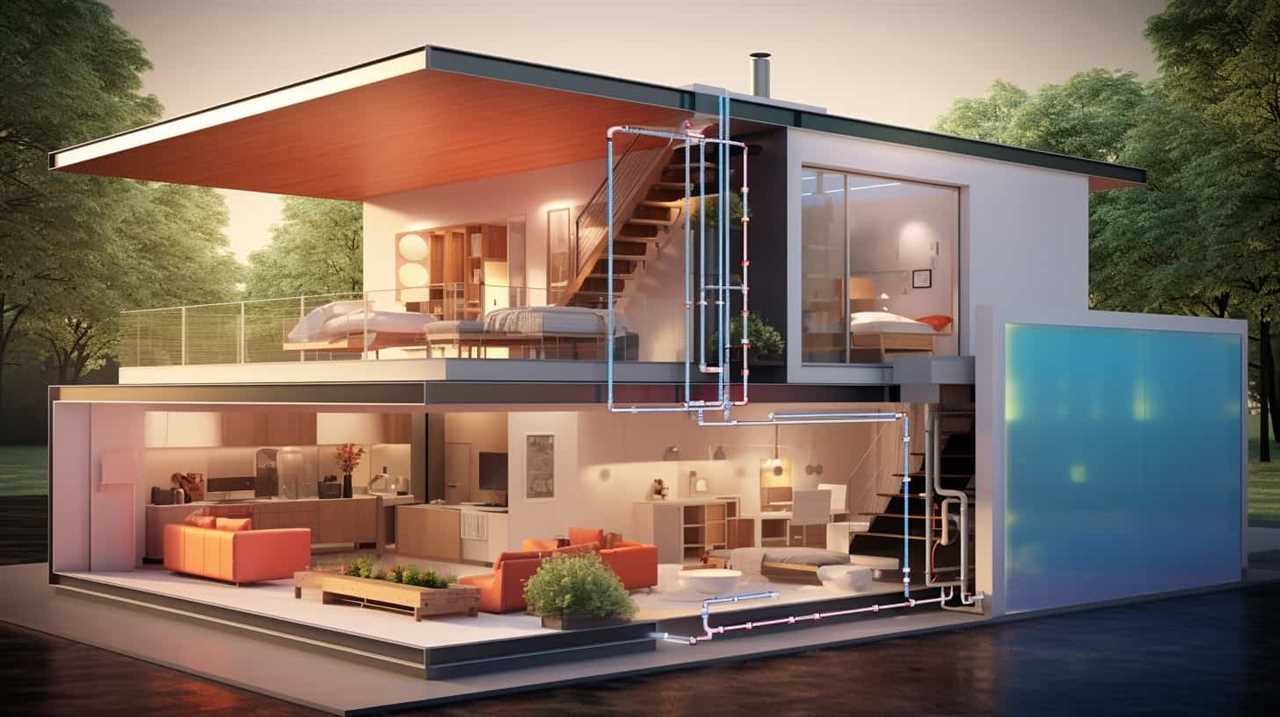
Variable-Speed Compressor: The advanced heat pump technology in our systems incorporates variable-speed compressors, which automatically adjust the speed of the compressor to match the heating or cooling needs of your home. This results in improved energy efficiency and precise climate control.
Enhanced Air Filtration: Our heat pumps are equipped with advanced air filtration systems that remove allergens, dust, and other pollutants from the air. This feature ensures that you and your family breathe clean and healthy air, promoting a comfortable and safe indoor environment.
With these advanced features and technology, our heat pumps provide unparalleled comfort and energy efficiency, making them an excellent choice for residential climate control.
Comparing Heat Pumps to Other HVAC Systems: Pros and Cons
Let’s explore the pros and cons of heat pumps compared to other HVAC systems.
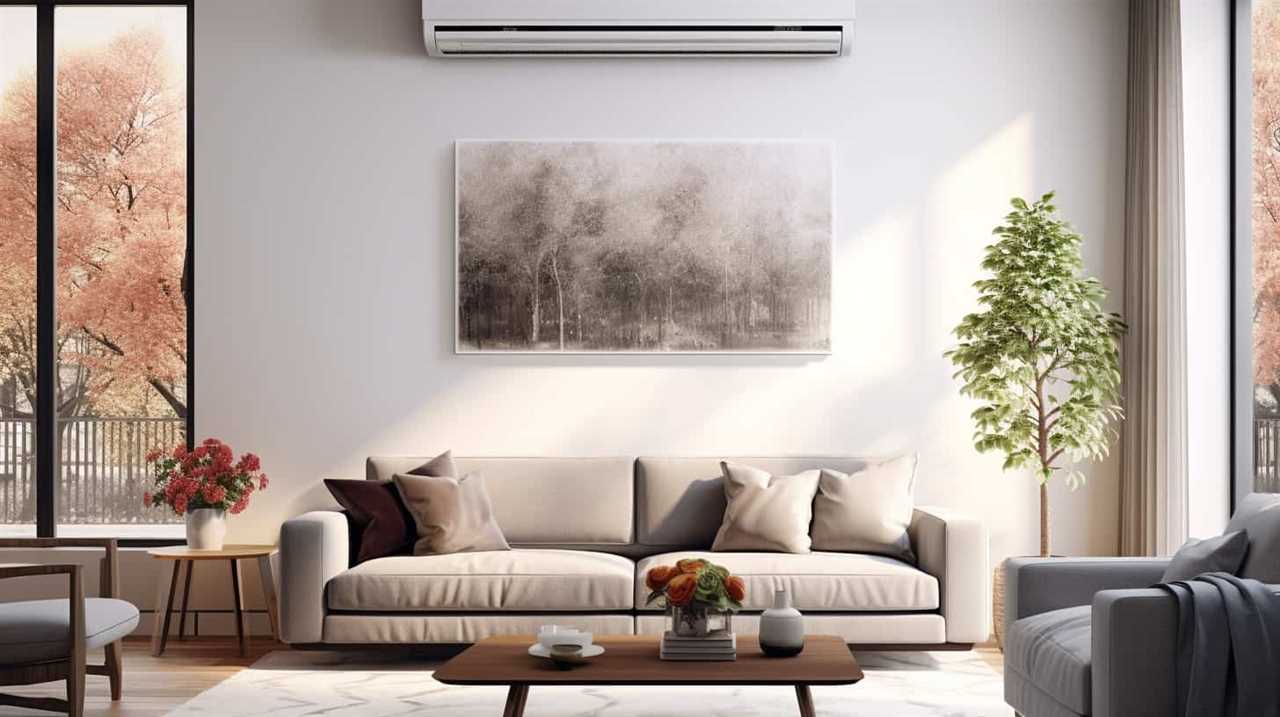
When it comes to traditional air conditioning (AC) units, heat pumps have several advantages. First, heat pumps can both cool and heat your home, offering year-round comfort. In contrast, AC units only provide cooling.
Second, heat pumps are more energy-efficient than traditional AC units, resulting in lower utility bills. They transfer heat instead of generating it, which leads to significant energy savings.
On the other hand, heat pumps may have higher upfront costs compared to AC units. Additionally, in regions with extremely cold temperatures, heat pumps may struggle to provide efficient heating compared to furnaces.
Despite these limitations, the energy savings and versatility of heat pumps make them an attractive option for residential climate control.
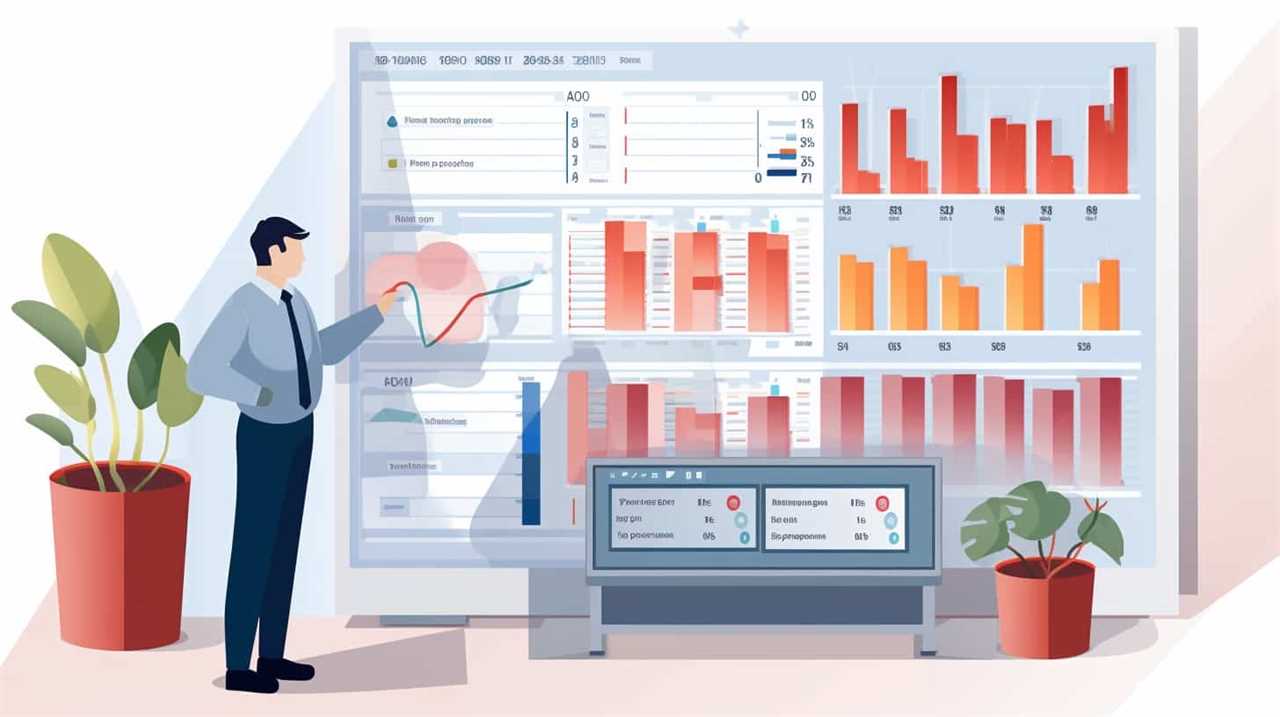
Frequently Asked Questions
Are Heat Pumps Suitable for All Types of Homes?
Heat pumps are suitable for most homes due to their efficiency and ability to provide both heating and cooling. However, the cost of heat pump installation can vary depending on factors such as the size of the home and existing ductwork.
How Long Does It Typically Take to Install a Heat Pump?
Installing a heat pump can be a breeze, taking just a few hours. Factors like the size of your home, existing HVAC system, and accessibility can affect installation time. But don’t worry, we’ll handle it all!
Can a Heat Pump Be Used as the Primary Heating and Cooling System in a Home?
Yes, a heat pump can serve as the primary heating and cooling system in a home. It offers high efficiency and numerous benefits, making it an excellent choice for residential climate control.
What Is the Average Lifespan of a Heat Pump?
The average lifespan of a heat pump depends on various factors such as regular maintenance and usage. It is essential to follow the manufacturer’s guidelines for maintenance to ensure optimal performance and longevity of the heat pump.
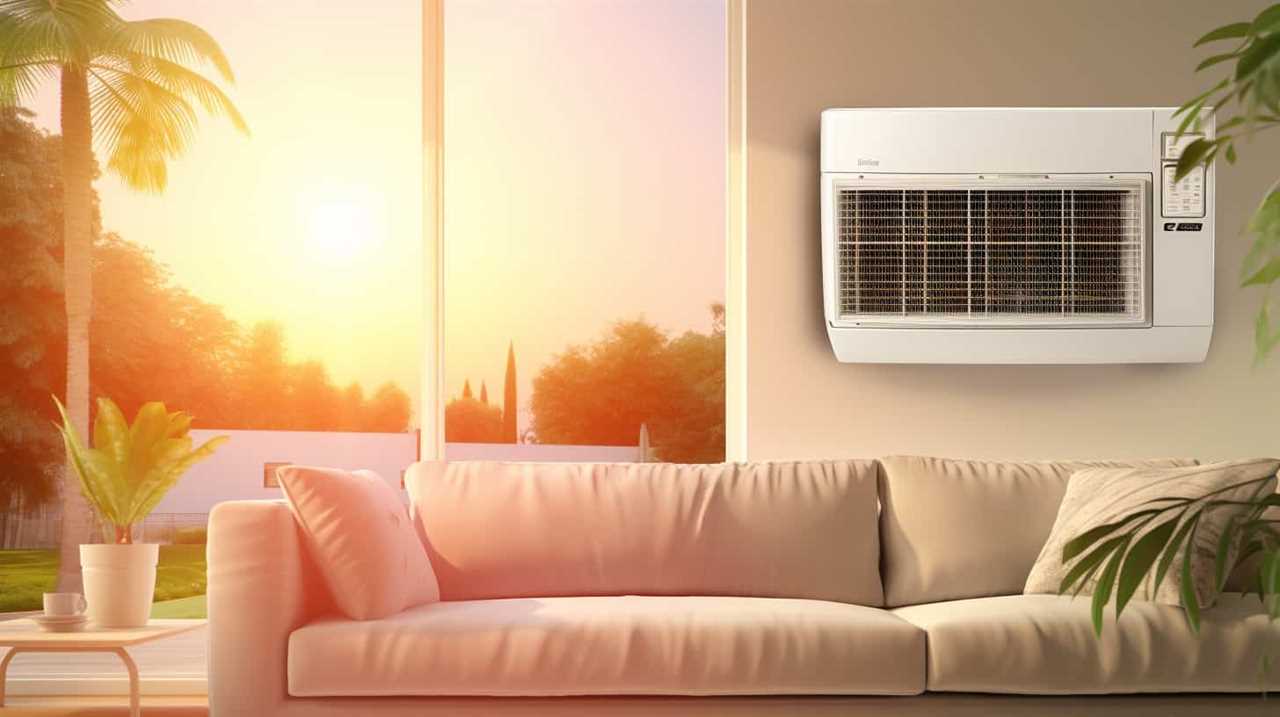
Are Heat Pumps Noisy When Operating?
Yes, heat pumps can be noisy when operating. However, with advancements in heat pump efficiency and noise reduction techniques, manufacturers have developed quieter models to provide a more comfortable and peaceful environment.
What Are the Benefits of Using Heat Pumps for Residential Climate Control?
Residential heat pumps for climate control offer numerous benefits. These systems efficiently extract and distribute heat from the air, providing both heating and cooling capabilities. The key advantage lies in their energy efficiency, as they use less electricity compared to traditional HVAC systems. Additionally, they offer precise temperature control, improved air quality, reduced carbon footprint, and potential cost savings in the long run.
Conclusion
In conclusion, heat pumps offer numerous advantages for residential climate control.
Did you know that heat pumps can provide up to 300% more energy efficiency compared to traditional heating systems?
With their ability to both heat and cool homes, choosing the right size heat pump can ensure optimal comfort throughout the year.
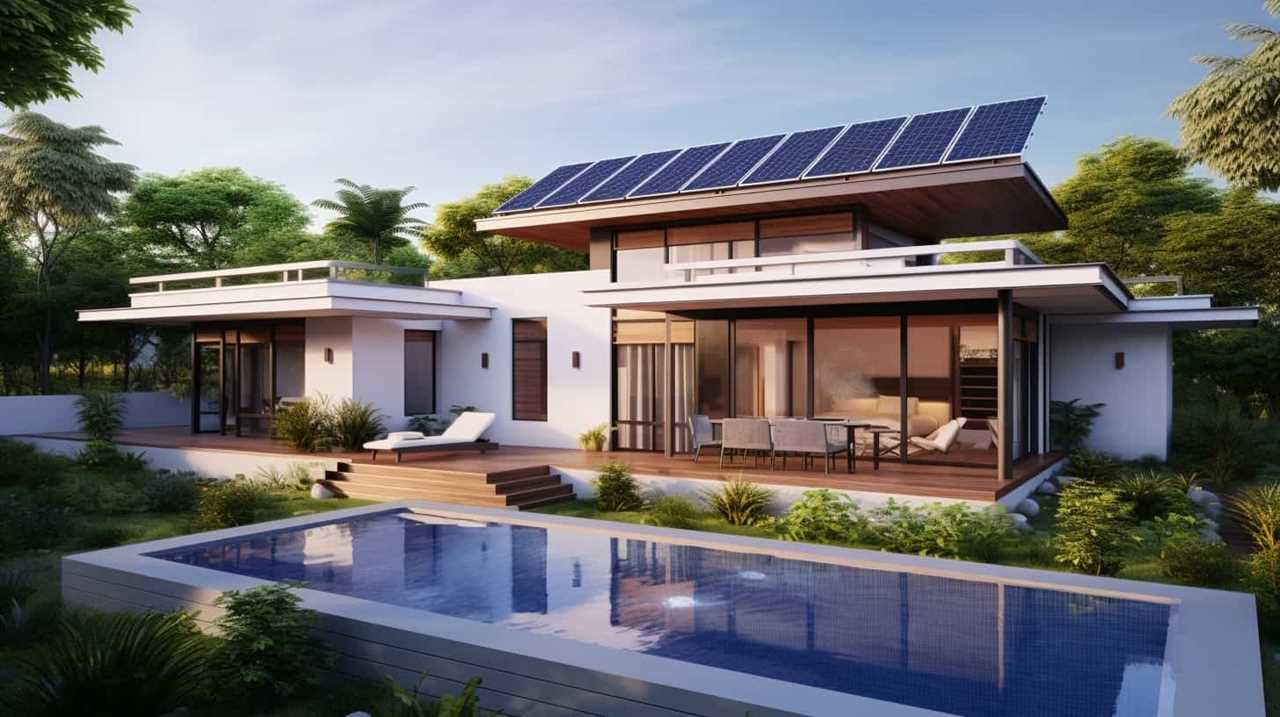
By properly maintaining and troubleshooting your heat pump system, you can maximize its lifespan and performance.
Consider exploring advanced features and technology to further enhance your home’s climate control capabilities.


